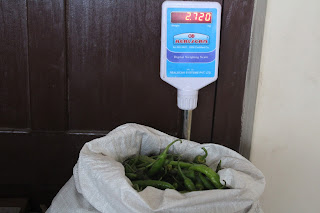 Forty-one monks of the Chokyi Gyatso Buddhist Institute in Dewathang, Samdrup Jongkhar, are taking part in organic gardening classes that aspire to teach sustainable nurturing of soil through practical activities.
Forty-one monks of the Chokyi Gyatso Buddhist Institute in Dewathang, Samdrup Jongkhar, are taking part in organic gardening classes that aspire to teach sustainable nurturing of soil through practical activities.
The Organic Gardening class is part of Lhomon Education’s curriculum to provide opportunity to learn the basics of livelihood and give hands on experience.
Lhomon Education (LME) is a grassroots initiative to foster the development of innovative curricula designed specifically for Bhutanese students to integrate principles of Gross National Happiness effectively and practically.
 Lhomon Society is helping teachers to create unique GNH-based curricula for use in a variety of educational environments.
Lhomon Society is helping teachers to create unique GNH-based curricula for use in a variety of educational environments.
Lhomon Education currently is a pilot program.
“Among many practical and concrete manifestations of GNH vision, the use of vegetable gardens is important to teach key dimensions of the science curriculum,” said Dawa, who is a resident teacher at the Buddhist Institute. “They learn about the elements necessary for healthy soil and ways of growing healthy food products without the use of chemical fertilizers.”
 The Institute has created a garden to promote organic gardening and instill in the young minds the Bhutanese farming traditions, and its role, in the long run, to achieve food security and self-sufficiency in the country.
The Institute has created a garden to promote organic gardening and instill in the young minds the Bhutanese farming traditions, and its role, in the long run, to achieve food security and self-sufficiency in the country. “The study guides the students toward a genuine and heartfelt stewardship of the earth and impart in them a deeper understanding of the interconnection and interdependence law of nature through practical means and not just through the books,” said Dawa. “Making their own composts using green and dry leaves, cow dung and urine functions as a means of teaching science, cultural history and literature, and other GNH principles and values which they’ll learn to uphold in the process.”
“The study guides the students toward a genuine and heartfelt stewardship of the earth and impart in them a deeper understanding of the interconnection and interdependence law of nature through practical means and not just through the books,” said Dawa. “Making their own composts using green and dry leaves, cow dung and urine functions as a means of teaching science, cultural history and literature, and other GNH principles and values which they’ll learn to uphold in the process.”
The students learn the basic aspects of organic gardening as part of their lessons, which is taught by a local farmer. The students engaged in the activity are encouraged to develop team work and cooperation rather than going for competition among their groups.
 Dawa said that the students are their own architects in the garden, shaping their own beds, calculating, measuring, and designing them in whatever way they desire. He said the depth, width and the line that they keep track of while sowing seeds are an estimation and mathematical concept in itself.
Dawa said that the students are their own architects in the garden, shaping their own beds, calculating, measuring, and designing them in whatever way they desire. He said the depth, width and the line that they keep track of while sowing seeds are an estimation and mathematical concept in itself.
“I prefer working in the garden as compared to sitting in the class than to just listening to the organic gardening from my teachers,” said 14-year-old monk Sonam Wangchuk. “I get to work with my friends as a team. Besides, I’ve learned to make compost and garbage enzyme. I also learned to do measurements for the compost shelter. I like practical gardening work.”
The smiles and satisfactions on the students’ face during the harvest period indicate their own appreciation of the hard work and hands on learning experience that is taking place.
Lhomon Education plans to encourage and educate the community and schools around to take up organic gardening by teaching them methods of composting and other related organic practices.
By Sonam Yangdon, a journalist; TheBhutanese


No comments:
Post a Comment